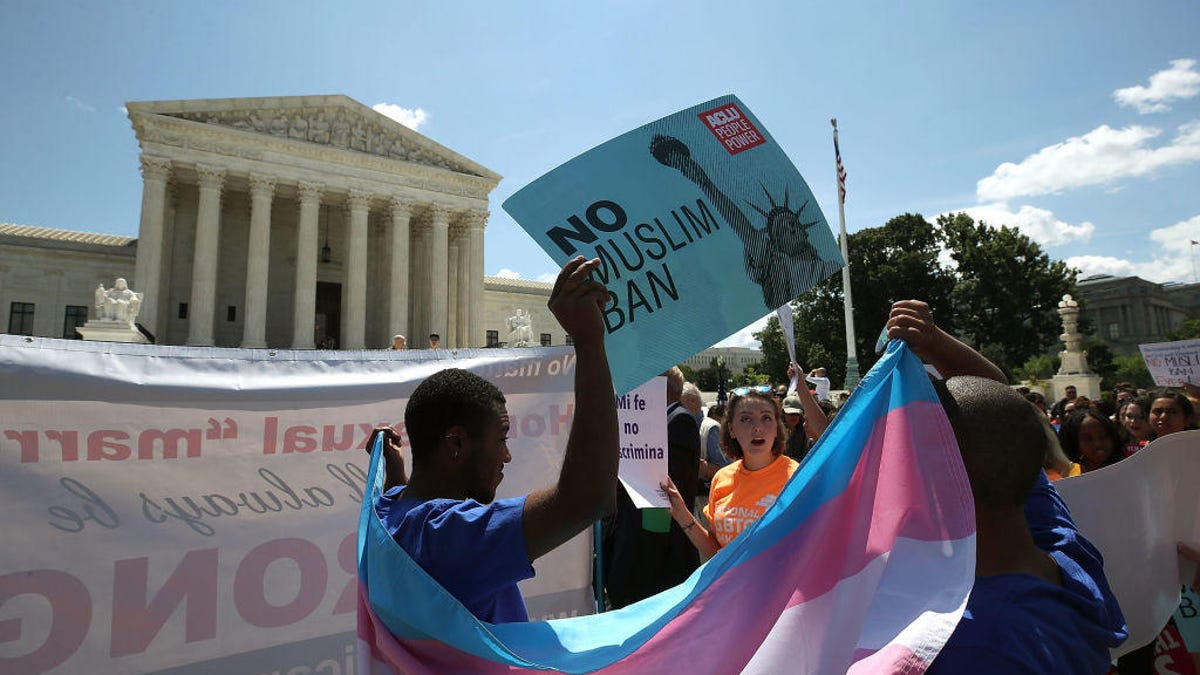Where’s the outrage? How the Trump travel ban went from fury to forgotten
Social media and a frenetic news cycle means we can’t stay committed to one issue.

The Supreme Court upheld the Trump administration's travel ban.
The internet doesn't stay mad.
If you logged on to a social media platform Tuesday, you might have heard news that the Supreme Court upheld the Trump administration's travel ban -- a contentious immigration policy that mostly blocked people from several predominantly Muslim countries from coming to the US under various circumstances.
People are upset. But they weren't outraged last week, nor was there any significant online outrage about the travel ban during 2018. Where did the early 2017 fervor that fueled protests and promises go?
In a world where the news cycle never seems to take a breath, online outrage over stories is far easier to gin up than sustain. There's a level of drive-by engagement that we're forced into because of the circumstances.
Just think about the controversies that likely worked you up in the last few weeks: actress Roseanne Barr losing her show after an offensive tweet about former Obama adviser Valerie Jarrett, an immigration policy that separated migrant children from their parents crossing the border, net neutrality laws getting rolled back. Can you even remember what happened a month ago?
"With every social network and app we adopt, we're becoming very good at surfing the tops of waves rather than diving deeper," said Brian Solis, an analyst with the Altimeter Group.
By the numbers
Looking at numbers from Reddit, Facebook and Twitter, we can compare the number of public travel ban posts and the engagement they spurred. In doing so, we saw a pretty dramatic drop over time, even as we got closer to the Supreme Court decision.
On Facebook, for example, there were more than 18,000 results for the phrase "travel ban" between January 27 and February 28, 2017. But for the entirety of 2018, up until June 25, there have been only 1,606 results.
If you hop on over to Reddit, you'll find that the top five posts relating to the topic -- like a CNBC article on the US appeals court upholding the suspension of the ban -- racked up 41,715 interactions among them. We couldn't even compile a top three for 2018. Instead, the top three posts accounted for about 2,023 interactions.
And on Twitter, "travel ban" had 7,753 mentions in the month after the first ban. In 2018, it was mentioned a mere 871 times.
To get these totals, we used Crowdtangle, a tool owned by Facebook that gathers publicly available data from social media platforms. Reddit's numbers were pulled from a total of 788 major subreddits. For Facebook, 6,955 pages were crawled, and for Twitter 17,064 accounts were included. The phrase "travel ban" was the search query for each of the platforms. The rankings of each search were determined by "Total Interactions," which are defined as upvotes and comments for Reddit, likes, comments and shares for Facebook and likes, retweets and replies for Twitter.
Emotion vs. policy
There are a few reasons why we tend to see dips in interest when it comes to the news stories, even the ones that seem to consume everything when they're fresh.
One is that issues like these tend to be emotional, but emotions fade, said Vincent Raynauld, assistant professor of communication studies at Emerson College. He calls it "clickbait politics" and said it's particularly true of the 18- to 29-year-old demographic, which gets most of its news from social media. It's more about what interests them than following the ins and outs of policy.
Plus, the umpteenth update on a story that's been out for a while just might not pack the same emotionally resonant punch as when it broke.
"When an issue is emotionally appealing, people tend to latch onto the issue until there's a more emotionally appealing that pops up," he said.
And when you're scanning through a social news feed, there's always something to move on to.
Consider that the summit between the US and North Korea was the same week that public outcry started mounting about the Trump administration's policy of separating families at the US-Mexico border. Raynauld said the sheer volume of information people are exposed to means they shift interest quickly.
Solis describes the media landscape as of late as frequently frenzied.
He also noted that for stories that don't have some central organizing element like the students from Marjory Stoneman Douglas High School, for example, it's easy for distraction to set in and for attention to get diverted elsewhere.
Letting the air out
So, what's the upshot of rage that fizzles?
Aside from stories falling through the cracks that perhaps merit better attention, Solis sees a lot of mischanneled energy.
In a way, people get online and get the feelings out of their systems.
"When we go on social media to vent, we are letting air out of the balloon with zero outcome," he said. "If you were able to organize people to channel that energy in much more productive ways, you would have a movement."
CNET's Morgan Little contributed to this report.
CNET Magazine: Check out a sample of the stories in CNET's newsstand edition.
Fight the Power: Take a look at who's transforming the way we think about energy.

